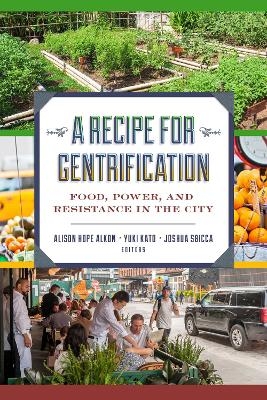
A Recipe for Gentrification
Food, Power, and Resistance in the City
Seiten
2020
New York University Press (Verlag)
978-1-4798-3443-3 (ISBN)
New York University Press (Verlag)
978-1-4798-3443-3 (ISBN)
Honorable Mention, 2021 Edited Collection Book Award, given by the Association for the Study of Food and Society
How gentrification uproots the urban food landscape, and what activists are doing to resist it
From hipster coffee shops to upscale restaurants, a bustling local food scene is perhaps the most commonly recognized harbinger of gentrification. A Recipe for Gentrification explores this widespread phenomenon, showing the ways in which food and gentrification are deeply—and, at times, controversially—intertwined.
Contributors provide an inside look at gentrification in different cities, from major hubs like New York and Los Angeles to smaller cities like Cleveland and Durham. They examine a wide range of food enterprises—including grocery stores, restaurants, community gardens, and farmers’ markets—to provide up-to-date perspectives on why gentrification takes place, and how communities use food to push back against displacement.
Ultimately, they unpack the consequences for vulnerable people and neighborhoods. A Recipe for Gentrification highlights how the everyday practices of growing, purchasing and eating food reflect the rapid—and contentious—changes taking place in American cities in the twenty-first century.
How gentrification uproots the urban food landscape, and what activists are doing to resist it
From hipster coffee shops to upscale restaurants, a bustling local food scene is perhaps the most commonly recognized harbinger of gentrification. A Recipe for Gentrification explores this widespread phenomenon, showing the ways in which food and gentrification are deeply—and, at times, controversially—intertwined.
Contributors provide an inside look at gentrification in different cities, from major hubs like New York and Los Angeles to smaller cities like Cleveland and Durham. They examine a wide range of food enterprises—including grocery stores, restaurants, community gardens, and farmers’ markets—to provide up-to-date perspectives on why gentrification takes place, and how communities use food to push back against displacement.
Ultimately, they unpack the consequences for vulnerable people and neighborhoods. A Recipe for Gentrification highlights how the everyday practices of growing, purchasing and eating food reflect the rapid—and contentious—changes taking place in American cities in the twenty-first century.
Alison Hope Alkon (Editor) Alison Hope Alkon is Professor of Sociology at the University of the Pacific. She is co-editor of The New Food Activism and Cultivating Food Justice and author of Black, White, and Green: Farmers Markets, Race and the Green Economy. Yuki Kato (Editor) Yuki Kato is Associate Professor of Sociology at Georgetown University. She is the co-editor of A Recipe for Gentrification: Food, Power, and Resistance in the City. Joshua Sbicca (Editor) Joshua Sbicca is Associate Professor of Sociology at Colorado State University. He is the author of Food Justice Now!: Deepening the Roots of Social Struggle.
| Erscheinungsdatum | 09.07.2020 |
|---|---|
| Zusatzinfo | 26 hts / 4 t / 4 figs / 6 m |
| Verlagsort | New York |
| Sprache | englisch |
| Maße | 152 x 229 mm |
| Gewicht | 699 g |
| Themenwelt | Sozialwissenschaften ► Soziologie |
| ISBN-10 | 1-4798-3443-2 / 1479834432 |
| ISBN-13 | 978-1-4798-3443-3 / 9781479834433 |
| Zustand | Neuware |
| Haben Sie eine Frage zum Produkt? |
Mehr entdecken
aus dem Bereich
aus dem Bereich
Ein Grundproblem der Moderne | Die erste umfassende Studie zum …
Buch | Hardcover (2024)
Suhrkamp (Verlag)
32,00 €


